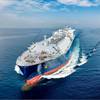Bollinger Begins First Phase of Deepwater Program
Bollinger and Halter Marine, Inc., of Gulfport, Miss., formed HBJV, a joint venture which is a sub-contractor to Northrop Grumman Ship Systems in the construction of new cutters and the modification and lengthening of others. VT Halter Marine who recently purchased the shipyard assets of Halter Marine has preliminary agreement with Bollinger to acquire Halter’s share in this Joint Venture. Matagorda is the first of 49 Island Class cutters built by Bollinger between 1984 and 1991 that will undergo identical changes. When the modernization program is fully underway, Bollinger expects five of the cutters to be under simultaneous retrofit, with one vessel being returned to the fleet every six weeks or approximately seven cutters each year.
VT Halter will construct the superstructure buildings at its shipyard in Pascagoula and transport them to Bollinger’s Lockport shipyard where they will be incorporated into each cutter. When completed at Bollinger, the superstructures, also called “houses,” will include much of the C4ISR equipment, more staterooms to accommodate mixed gender crews, and a ship’s office including space to handle medical emergencies. Total value of the 110 retrofit contract to Bollinger is expected to be approximately $200 million over the contract life. The project will involve about 100 people at Bollinger’s new construction shipyard in Lockport, with the possible addition of up to 25 administrative, technical and production personnel. The importance of this phase of the DEEPWATER program was demonstrated by the presence of Admiral Thomas H. Collins, Commandant of the Coast Guard, who officiated at the decommissioning of the cutter in ceremonies hosted by Donald T. “Boysie” Bollinger, chairman and CEO of Bollinger Shipyards, Inc. DEEPWATER, the largest program in the Coast Guard’s history was developed to guarantee the nation’s maritime homeland security by being able to identify and intercept targets of interest as far from U. S. shores as possible. The program is aimed at replacing the majority of the USCG’s aging fleet of cutters and aircraft and upgrading obsolete computer and sensor technologies.
The $17 billion Deepwater program which may extend to 30 years, includes the acquisition of up to 91 ships, 35 fixed-wing aircraft, 34 helicopters, 76 unmanned surveillance aircraft, and upgrade of the 49 Island Class cutters for seamless integration into the nation’s C4ISR capabilities. Also included in the plan are three new surface craft: 425-ft. National Security Cutters capable of a maximum speed of 28 knots; 341-ft. Offshore Patrol Cutters, and 130-ft. Fast Response Cutters with a top speed of 30 knots. Bollinger and VT Halter will equally share the design and building of 58 of the 130-foot cutters, valued at over $600,000,000. The Halter-Bollinger JV is a sub-contractor to a joint venture between Northrop Grumman Corp. and Lockheed Martin Corp. called Integrated Coast Guard Systems (ICGS). It was designed as a single point of accountability for the contract activities. ICGS will manage about 100 suppliers in 32 states and four international partners who will provide everything from new administrative systems to new and upgraded ships and boats, airplanes and helicopters. The ICGS contract does not include smaller rescue and patrol boats, buoy tenders, workboats, icebreakers or shore side facilities.
Of 39 similar navy and coast guard fleets surveyed worldwide, the U. S. Coast Guard fleet is the 37th oldest. In addition to its expanded responsibilities as part of the new Homeland Security Department, the Coast Guard performs many missions vital to the nation’s physical, economic, and environmental security. Primary duties include search and rescue, maritime emergency response, military operations, anti-drug patrols, illegal migrant interdiction and fisheries enforcement.












